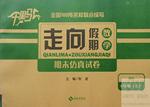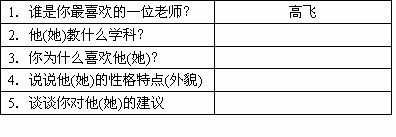
本篇大意是:鸡场主怀特发现夏天鸡下蛋少,决定在鸡舍装置空调,卖空调的老板到怀特处,见其家尚未安装空调,便想扩展生意,不单给鸡舍装上空调,还建议给怀特的妻子屋安一台空调,但怀特没有同意,他的理由是,给鸡舍装上空调,鸡能多下蛋,给他老婆安上空调,并不能产生经济效益.
文章反映了农场、牧场、家禽饲养场现代化的进展,反映了在市场经济背景下,人们所具有的强烈经济意识,十分幽默而富有趣味.双方都有自己的生意经,各自有自己的小算盘,都是以多捞钱为目的,这是现代社会中商人心理的实际写照.
Mr White was a chicken farmer. He had hundreds of chickens, and sold the eggs and the meat and got quite a lot of money for them, but he lived in a very hot part of the country, and he found that his hens could hardly lay(空调) any eggs in the summer. So he decided to put air-conditioning(空调) into his chicken-house so that the hens would lay well all through the year and he could get more eggs and in that way get more money.
The owner of the air-conditioning company(公司) came to see him, and when he saw Mr White's house, he thought that he might be able to persuade(劝说) him to buy some air-conditioning too.
“Your wife would be much happier and have a nicer house to live in then.” he said to Mr White. But Mr White was not interest.
“My wife doesn't lay eggs.” he said.
根据短文内容,判断对错.
1.Mr White's hens could lay few eggs when the weather was too hot.
( )
2.Mr White decided to buy air-conditioning for his house because he wanted to make his wife much happier.
( )
3.The owner of the company hoped to put air-conditioning into both Mr White's house and his chicken-house.
( )
4.Air-conditioning in Mr White's house would not bring him more money.
( )
5.Neither Mr White nor the owner of the company wanted to get more money.
( )
 千里马走向假期期末仿真试卷寒假系列答案
千里马走向假期期末仿真试卷寒假系列答案科目:初中英语 来源:双色笔记初中英语总复习 题型:050
本篇大意是:木匠约翰给主人公的妻子做了一个小饭桌,结账时的账单上把成本费17.00、油漆料钱1.50、工价8.00和日期10一起相加,多计价10元,结果被主人发现了,但他并没有直接批评多要钱的木匠,只是诙谐地说:“月底30日做比月初10日做,还要贵些,是不是?”而且只付了木匠应得到的26.50元钱.很明显,本篇比上篇更难些,因上篇中主人公怀特和厂家双方处理的问题是直接的,直言不讳,而本篇中的主人公却是明人做暗事,肚内藏机关,木匠虽然诡谲,主人却更机灵,一眼看穿了木匠的把戏,但他处理问题颇有技巧,既解决问题,不多花钱,又不搞得很僵,双方不快,体现了现代生意场中的交往策略和洽谈风格.我国正在建设社会主义市场经济,这是法制化、规范化的市场经济,反对不正当的竞争.此文有一定的现实意义,文中的内容联系着当代的社会生活,通过英语试卷,同样可以检验学生:的审视能力.
Our village carpenter(木匠), John Hill, came one day and made a dining table for my wife. He made it just the right size to fill the space between the two windows. When I got home that evening, John was drinking a cup of tea and writing out his bill(账单) for the job.
My wife said to me, quietly, “That's his ninth cup of tea today.” But she said, in a loud voice, “It's a beautiful table, dear, isn't it?”
“I'll decide about that when I see the bill,” I said.
John laughed and gave me his bill for the work. I read:
When I was looking at the bill, John said, “It's been a fine day, hasn't it? Quite sunny.”
“Yes,” I said. “I'm glad it's only the 10th of November.”
“Me, too,” said John. “You wait-it'll be a lot colder by the end of the month.”
“Yes. Colder-and more expensive! Dining tables will be £20 more expensive on November 30th, won't they, John?”
John looked hard at me for half a minute. Was there a little smile in his two blue eyes? I gave his bill back to him.
“If it isn't too much trouble, John,” I said, “please add it up again. You can forget the date.”
I paid him £26.50 and he was happy to get it.
1.Why did John talk about the weather when the writer was looking at the bill?
A Because he didn't want the writer to go through the bill carefully.
B.Because it was really a fine day.
C.Because he wanted the writer to check the bill carefully.
D.Because he wanted to tell the writer what the weather was like.
2.Why did the writer say that dining tables would be £ 20 more expensive on November 30th?
[ ]
A.Because it was difficult to make dining tables in cold weather.
B.Because paint would be more expensive.
C.Because the cost of wood would be more expensive.
D.Because he thought John would almost certainly add the date to the cost of the dining table.
3.The writer thought John would ask for ________ if he made a dining table on the last day of November.
[ ]
4.When the writer gave him the money, John was happy because ________.
[ ]
A.he got what he should get for his work
B.he got much more money for his work
C.he got the money easily
D.he didn't have to add up the costs again
5.From the story we know that ________.
[ ]
A.John made a mistake in the bill
B.John tried to fool the writer in order to get more money for his work
C.John had written out the bill before the writer got home
D.John still wanted to get £36.50 for his work in the end
查看答案和解析>>
科目:初中英语 来源:双色笔记初中英语总复习 题型:056
书面表达
假定你是阳光中学的学生:,你校最近开展“最受欢迎的教师”问卷调查活动.请按照下面表格的要求,结合自己的实际和真实感受,用英语写一篇60~80词的短文.
说明:短文中不得出现你的姓名、校名;你最喜欢的教师名字一律用高飞(Gao Fei).短文的题目和开头部分已给出(不计入总词数).
阳光中学2004年“最受欢迎的教师”问卷调查表(本表不用填写)

参考词汇(供选用):
hard, kind, interesting, helpful, encourage
My Favourite Teacher
My favourite teacher is Gao Fei.________________________________________
查看答案和解析>>
科目:初中英语 来源: 题型:阅读理解
| A.生者得致其严 严:严肃 |
| B.警劝之道 道:作用 |
| C.议之不徇 徇:徇私,袒护 |
| D.所谕世族之次 次:排列 |
| A.则足为后法则告诉不许 |
| B.惧后世之不知臣之壮也,犹不如人 |
| C.有意奸而外淑圣人不凝滞于物,而能与世推移 |
| D.先祖之屯蹶否塞以死死犹为厉鬼以击贼 |
| A.铭志能够著称后世,它的意义与“史”相接近,但是它的内容却与“史”有所不同。 |
| B.文中,作者就碑文写作提出了看法,一是撰写碑文要态度公正,二是撰写碑文要慎选作者。 |
| C.文章既论述了铭志的作用,也由衷赞扬了欧阳修为他祖父所作铭志的“公与是”。 |
| D.这篇文章虽是感谢信,但又不仅仅止于感谢,文章还重点述说了“史”的社会意义,也表达了对道德文章兼胜的赞许与追求。 |
查看答案和解析>>
科目:初中英语 来源:同步题 题型:写作题
查看答案和解析>>
湖北省互联网违法和不良信息举报平台 | 网上有害信息举报专区 | 电信诈骗举报专区 | 涉历史虚无主义有害信息举报专区 | 涉企侵权举报专区
违法和不良信息举报电话:027-86699610 举报邮箱:58377363@163.com